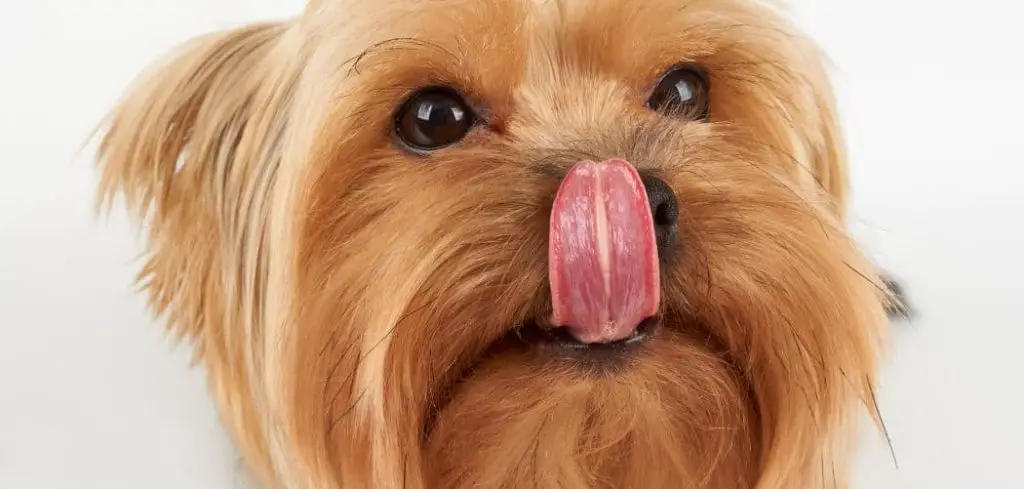Dogs sneeze from time to time, and a little nose-licking can seem like nothing more than quirky behavior.
But when sneezing and licking the nose occur together, it may point to irritation, infection, or even something lodged inside your dog’s nasal passages. These signs can range from mild to serious, making it important to pay attention.
We outline the possible causes of dog sneezing and nose licking, what you can do at home, and when to seek veterinary help.
Dog Sneezing and Licking Nose — Why It Happens
Sneezing and nose-licking often occur when a dog’s nasal passages are irritated or inflamed. This may happen due to allergies, infections, foreign bodies like grass seeds, nasal mites, or even dental problems that affect the sinuses.
In some cases, it may simply be due to dry air or environmental triggers, but persistent symptoms suggest an underlying health issue.

Dog Sneezing and Licking Nose: Common Causes
Allergies
Allergies are one of the most common reasons for sneezing and frequent nose-licking. Just like humans, dogs can react to pollen, dust, mold, cleaning chemicals, or even certain foods.
When allergens irritate the nasal passages, your dog may sneeze repeatedly and lick their nose in an attempt to soothe the irritation.
Other signs might include watery eyes, itchy skin, or paw chewing. While not always dangerous, untreated allergies can lower your dog’s quality of life and lead to chronic inflammation.
Read more: Dog Sneezing and Wheezing (When to worry)
Foreign Objects in the Nose
Grass seeds, foxtails, or even small debris can get lodged in your dog’s nasal passages. This creates immediate discomfort and leads to sneezing fits, pawing at the nose, and frequent nose-licking.
A foreign body can also cause nosebleeds, nasal discharge, or sudden sneezing attacks.
This situation is considered urgent because sharp seeds or foxtails can migrate deeper into tissues and cause serious infection.
Respiratory Infections
Viral or bacterial infections can inflame your dog’s nasal passages, leading to sneezing and excessive nose-licking.
Kennel cough, canine influenza, or bacterial rhinitis may be to blame.
You may notice additional symptoms such as coughing, nasal discharge (clear or yellow-green), lethargy, or loss of appetite.
These infections can spread easily between dogs, so prompt veterinary care is recommended.
Nasal Mites
Nasal mites are tiny parasites that live inside a dog’s nasal passages. They are irritating and cause sneezing, nasal discharge, and frequent licking of the nose.
Dogs with nasal mites may also paw at their face, snort, or have a reduced sense of smell.
These parasites are contagious between dogs and require prescription treatment to eliminate.
Dental Disease
Advanced dental disease can sometimes extend into the nasal cavity, especially in the case of upper tooth root abscesses.
This can cause chronic sneezing, nasal discharge, and discomfort that leads to nose-licking.
If your dog has bad breath, drooling, or difficulty eating in addition to sneezing and licking their nose, dental problems may be the underlying cause.
Left untreated, infections in the mouth can spread and cause severe complications.
Nasal Tumors
Although less common, tumors inside the nasal cavity can cause sneezing and repeated nose-licking. These growths may obstruct airflow, leading to noisy breathing, frequent sneezing, and sometimes bloody nasal discharge.
Older dogs are more at risk, and symptoms often worsen over time.
While not every case of sneezing indicates something serious, persistent or worsening signs should never be ignored.
What to Do If Your Dog Is Sneezing and Licking Their Nose
If your dog only sneezes and licks their nose occasionally, it may not be cause for concern. You can help by wiping away any discharge with a damp cloth and monitoring for changes.
Keeping your home free from dust, smoke, and strong fragrances may also reduce irritation.
For mild allergies, your vet may recommend antihistamines or other medications.
Avoid giving over-the-counter drugs without veterinary guidance. If you suspect a foreign object, infection, or parasites, do not attempt home removal or treatment—seek veterinary help immediately.
Maintaining good dental care, such as regular tooth brushing and professional cleanings, can also help prevent oral problems that affect the nasal cavity.
When to Call or Visit Your Vet
You should call your vet promptly if your dog’s sneezing and nose-licking are persistent, worsening, or accompanied by other symptoms such as nasal discharge, coughing, bleeding, or difficulty breathing.
Seek immediate veterinary attention if your dog is having trouble inhaling, has a sudden onset of sneezing after being outdoors, or if you notice blood from the nose.
These could signal foreign objects, infections, or more serious conditions that require urgent care.
Persistent sneezing combined with weight loss, facial swelling, or noisy breathing may suggest a tumor or advanced dental disease and should be checked as soon as possible.
Read more: Dog Sneezing and Running Nose (What it really means)
Key Takeaway
Sneezing and licking the nose can be as simple as irritation or as serious as an infection, parasites, or nasal tumors.
Occasional sneezing isn’t usually a concern, but ongoing or severe symptoms should always be evaluated by a vet.
Pay close attention to your dog’s overall behavior and health. With timely care and proper treatment, most causes of sneezing and nose-licking can be managed effectively, keeping your dog comfortable and healthy.
